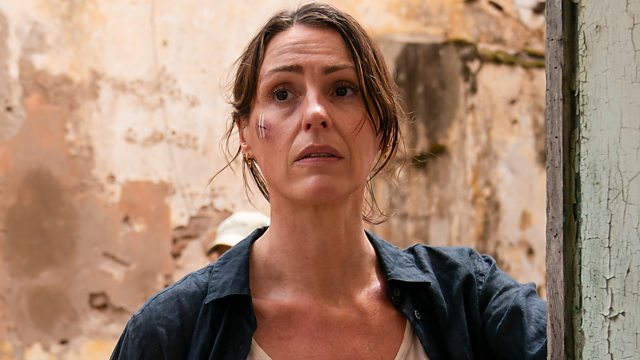1. Premise & Plot Overview 🔍
Building on the success of Season 1’s claustrophobic submarine setting, Season 2 (premiered December 10, 2023) places DCI Amy Silva (Suranne Jones) and DS Kirsten Longacre (Rose Leslie) into a vastly different environment: the geopolitical world of drone warfare. A demonstration of prototype RAF “R-PAS” combat drones at the Dundair Air Weapons Range in Scotland ends in catastrophe when a drone is tampered with, killing British and Wudyan dignitaries. This draws Silva into a sprawling murder-conspiracy investigation that leads her—and eventually Longacre—to Al‑Shawka Air Base in the fictional Middle Eastern state of Wudyan.
As Silva hunts a saboteur, interrogates military brass—like Air Vice Marshal Marcus Grainger (Dougray Scott) and Squadron Leader Eliza Russell (Romola Garai)—and navigates MI5 entanglements, Kirsten builds a separate case back in Scotland tracking suspicious deaths. Interwoven with romantic drama—Silva and Longacre are now co-parenting and expecting a child—the season culminates in a tense revelation of a conspiracy involving arms deals, rogue drones, and international political intrigue.
2. Characters & Performances
Suranne Jones as DCI Amy Silva
Jones anchors the season with her signature composed, resolute detective. She remains emotionally muted yet effective, demonstrating methodical poise even as the stakes escalate . Critics praised her no-nonsense style, though some found her demeanour “dour” and lacking warmth .
Rose Leslie as DS Kirsten Longacre
Leslie navigates her character’s dual roles as partner and investigator. With a pregnancy adding vulnerability, her on-screen chemistry with Silva continues to resonate—many fans root for #Silvacre.
Dougray Scott & Romola Garai
Scott plays the smooth yet morally ambiguous military chief pushing drone exports. Garai’s Eliza is equally complex—a leader torn between duty and conscience.
Supporting Cast
Actors like David Elliot (ex-soldier Ross Sutherland), Hiba Medina (Sabiha Chapman), and Amir El‑Masry (MI5’s Daniel Ramsey) strengthen the ensemble, each adding depth or conflict to the widening conspiracy.
3. Production & Setting
New Terrain, New Tension
Abandoning the submarine setting, Season 2 shifts to open environments—We see air bases, airports, and the Middle Eastern desert. This expansion provides visual variety, but some argue it loses the claustrophobic intensity that made Season 1 stand out.
Technical Realism
The storyline includes modern concepts like GPS spoofing, drone latency, and remote weapon systems. While this gives the show a tech edge, critics suggest it sometimes veers into jargon-heavy, less engaging territory .
International Filming
Filmed across Scotland—plus Moroccan locations doubling as Wudyan—and aircraft base sets, production expanded the world. However, early broadcast suffered from technical glitches in color grading.
4. Themes and Tone
Drone Warfare & Geopolitics
Core themes include the moral complexity of automated warfare, ethical arms deals, and questionable alliances. Grainger explicitly notes drone exports are tied to UK jobs and national security.
Saving Loved Ones
Silva’s commitment to family—co-parenting and expecting a child—adds personal stakes and tension with Longacre, contrasting their intense investigation.
Institutional Cover-up
The conspirators conceal sabotage to preserve defense deals and reputations, echoing post-Boscombe institutional distrust .
5. Reception & Criticism
Critical Opinion
- Metacritic gave a moderate score of 64/100, reflecting a mix of praise and skepticism.
- The Guardian applauded the shift, calling the season “a pacy, extremely good crime drama”.
- The Independent criticized it for overcomplication and peppering in social issues like LGBT+ rights, PTSD, and terrorism—”an undrinkably thick smoothie” of topics.
- The Arts Desk and Digital Spy both faulted its lack of submarine tension and uneven genre identity.
Viewer Sentiment
Reddit reactions were polarized:
“They did a second season… without a submarine? That sounds like a joke…”
“What a load of utter nonsense… the plotting… suspension of disbelief… beyond credulity”
But others defended it:
“Superb season 2. As good as its predecessor… production values were horrible though”
A few praised the drama but criticised action and acting:
“The thriller is back… but… unlikeable lead as dour as ever”
Controversy & “Wokeness”
Some viewers on social media labeled Season 2 as “woke” or “anti-UK,” especially unhappy with the Lesbians central relationship. Others praised the representation as authentic and important.
6. Strengths & Weaknesses
| Strengths | Weaknesses |
|---|---|
| Suranne Jones’s confident lead | Loss of submarine claustrophobia |
| Complex geopolitical narrative | Overcomplication of conspiracy threads |
| Bold LGBTQ+ representation | Tech-heavy dialogue can feel dry |
| Variety in settings & themes | Criticized as “messy” or “implausible” |
7. Cultural Impact
- Representation: Silva and Longacre continue to resonate as a rare married LGBTQ+ couple at the heart of primetime drama.
- Public Debate: Geo-political drone warfare raised relevant questions around modern military ethics .
- Franchise Viability: Despite mixed reviews, the BBC commissioned Season 3 (Feb 2025), indicating continued investment.
8. Final Assessment
What works
- A confident performance by Jones with high stakes investigation
- A topical storyline on drone warfare and global defense
- Strong representation of queer motherhood and professional women
What falters
- The loss of the submarine’s claustrophobic uniqueness
- Overly complex plot with jargon-heavy dialogue
- Uneven tone between thriller, procedural, and political drama
9. Conclusion
Vigil Season 2 is a bold reinvention—swapping a submarine for a sky-bound thriller involving drones, arms deals, and international intrigue. Its strengths are anchored in Suranne Jones’s compelling performance, a socially conscious storyline, and the rich development of Silva and Longacre’s relationship.
Yet, the shift from its claustrophobic roots came with growing pains: critics point to convoluted plotting, technical jargon, and tonal muddle. Some viewers admired its ambition; others craved the tension of Season 1’s enclosed setting.
Ultimately, Season 2 stands as a mixed but earnest chapter—still compelling, occasionally frustrating, and brimming with potential complexities. Whether it succeeded depends on whether you enjoy procedural intelligence or longed for sealed corridors and silent submersibles.

